Last updated on February 23, 2024
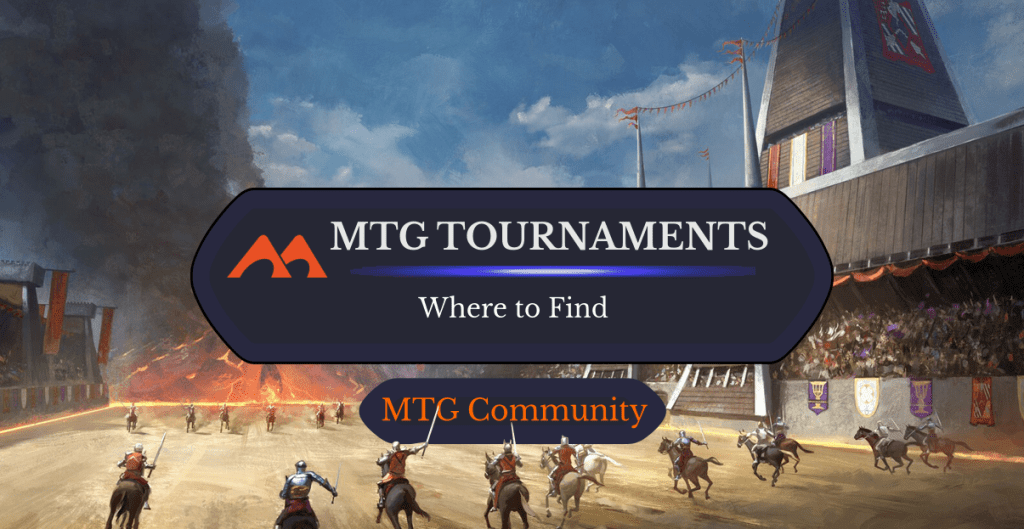
Tournament Grounds | Illustration by Cristi Balanescu
Greetings planeswalkers! A new Standard is right around the corner and the Pro Tour is back. Now is as good a time as ever to jump into competitive Magic!
But how does one go about this? With so many different formats, tournament types, and ways to play the game, it can be a bit intimidating to keep track of it all. I’d like to give you a full rundown on everything concerning MTG tournaments, online or paper.
Whether you’re a returning veteran, new to tournaments, or actively engaged in the competitive scene, I hope you’ll find this helpful. Let’s jump right in!
MTG Arena
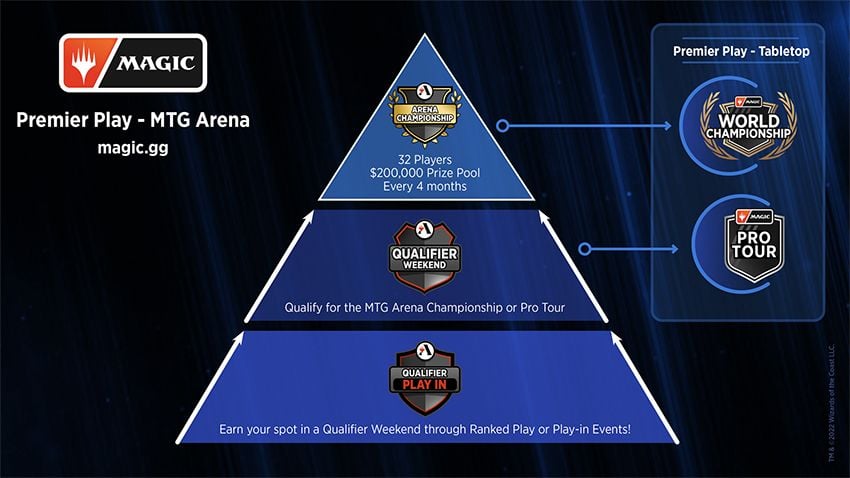
Released to the public over four years ago, MTG Arena is the more accessible and popular of Magic’s two digital clients. Arena is the only official way to play Magic with a ranked ladder system. It’s also the sole platform for digital-only formats like Alchemy and Historic that feature rebalanced cards.
Qualifier Weekends
Qualifier Weekends are your first step towards greatness on Arena. If you’re experienced with the old system of paper Magic you can think of Qualifier Weekends roughly as PTQs. The purpose of a Qualifier Weekend is to feed into either the Arena Championship or Pro Tour depending on the specifics of the event.
You can qualify for Qualifier Weekends via Ranked Play or Play-In events, the latter of which is a recent addition. If you want to use Ranked Ladder to enter a QW you have to finish in the top 250 of any format. If you finish in the top 1,200 you’re awarded a free entry into a Qualifier Play-In. You can also qualify for a QW with a strong finish in an Arena Open.
Qualifier Weekends are always 2-day events, but the format can be anything from Standard, Limited (Sealed/Draft), Alchemy, Historic, and Explorer. Prizes for the tournaments are as follows:
| Qualifier Weekend Day 1 | Qualifier Weekend Day 2 |
|---|---|
| Event length: 7 wins or 2 losses | Event length: 7 wins or 2 losses |
| 0 wins: 500 gems | 0 wins: 250 gems |
| 1 win: 1,000 gems | 1 win: 500 gems |
| 2 wins: 3,000 gems | 2 wins: 1,000 gems |
| 3 wins: 5,000 gems | 3 wins: 1,500 gems |
| 4 wins: 7,500 gems | 4 wins: 2,000 gems |
| 5 wins: 10,000 gems | 5 wins: 2,500 gems |
| 6 wins: 15,000 gems | 6 wins: 3,000 gems |
| 7 wins: 20,000 gems and entry to Day 2 | 7 wins: 5,000 gems and qualification for Arena Championship (and Pro Tour, once available) |
Qualifier Play-Ins
Qualifier Play-Ins offer a more expensive but time-efficient route to qualifying for Qualifier Weekends. You can enter them as many times as you’d like when they are available. You must go 4-0 (BO3) or 6-1 (BO1) to advance to the Qualifier Weekend. Full payouts are listed below:
| Qualifier Play-In (BO1) | Qualifier Play-In (BO3) |
|---|---|
| Event length: 6 matches regardless of record | Event length: 4 matches regardless of record |
| 0 wins: 500 gems | 0 wins: 500 gems |
| 1 win: 1,000 gems | 1 win: 2,000 gems |
| 2 wins: 1,500 gems | 2 wins: 4,500 gems |
| 3 wins: 3,000 gems | 3 wins: 6,000 gems |
| 4 wins: 4,500 gems | 4 wins: 6,000 gems and entry to the Qualifier Weekend |
| 5 wins: 6,000 gems | |
| 6 wins: 6,000 gems and entry to Qualifier Weekend |
Arena Championship
The Arena Championship is MTG Arena’s analog to the Pro Tour. I played in one of these myself with Temur () Reclamation a few years ago after qualifying with mono-green food. They’re 15-round tournaments with a top 8 and a lot of cash prizes starting at $500 and escalating dramatically as you reach top 8.
They usually have no Limited component and tend to be one of Standard, Alchemy, or Historic for the full tournament.
Arena Opens
While not tied to the formal competitive play structure, Arena Opens are a popular way to engage with the game competitively. These events happen every couple of months in a lot of different formats, and you can usually expect one for each new Limited set. Doing well in Day 2 of these Opens could win you up to $2.5k in cold hard cash.
There’s a Day 1 that requires you to go 7-2 (BO1) or 4-0 (BO3) to advance to Day 2. You can enter Day 1 as many times as you want, but keep in mind that entries aren’t cheap at about $25 in gems a pop, so beware!
Once you’ve reached Day 2 you’re allowed 1-2 losses and can win a maximum of 6-8 matches depending on that specific Open. The most recent Open was two Drafts and single elimination, but past Opens have been double eliminations with 7-8 wins total.
As you win more and more matches you eventually hit cash prizes of $1k to $2.5k depending on record.
MTG Melee
Official events are by no means the only way to compete on MTG Arena. MTG Melee is a very popular third-party website that helps connect players to all sorts of available Magic tournaments.
Melee has a substantial variety of events in just about every format and is a great one-stop resource for finding events online or offline. Digital tournaments can also be run through the website itself, which incidentally is how the Arena Championship I played in was run.
Paper/IRL
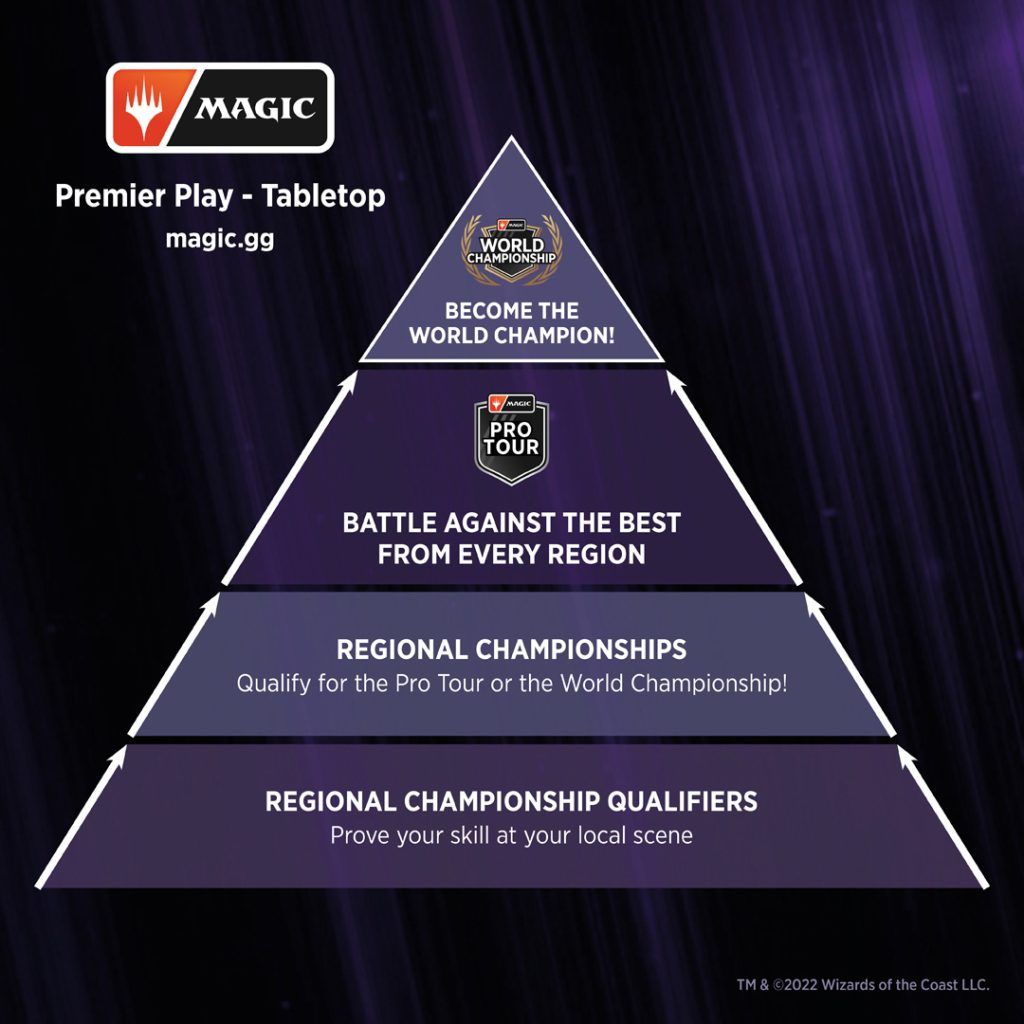
Paper MTG will always be the classic way to play Magic, even if the last few years haven’t been kind to it. Thankfully paper Magic is returning again, and Regional Championship Qualifiers provide a great reason to do so!
Regional Championship Qualifiers
Regional Championship Qualifiers are your first step towards greatness in paper MTG. If you played with the old system they’re more or less PPTQs. These are local tournaments hosted by game stores, with the format chosen by the store themselves. Prize support generally varies but you can expect either cash prizes or sealed product depending on what the LGS has to offer.
One nice bonus is that RCQs offer some free promos to players that compete or hit top 8, like these:
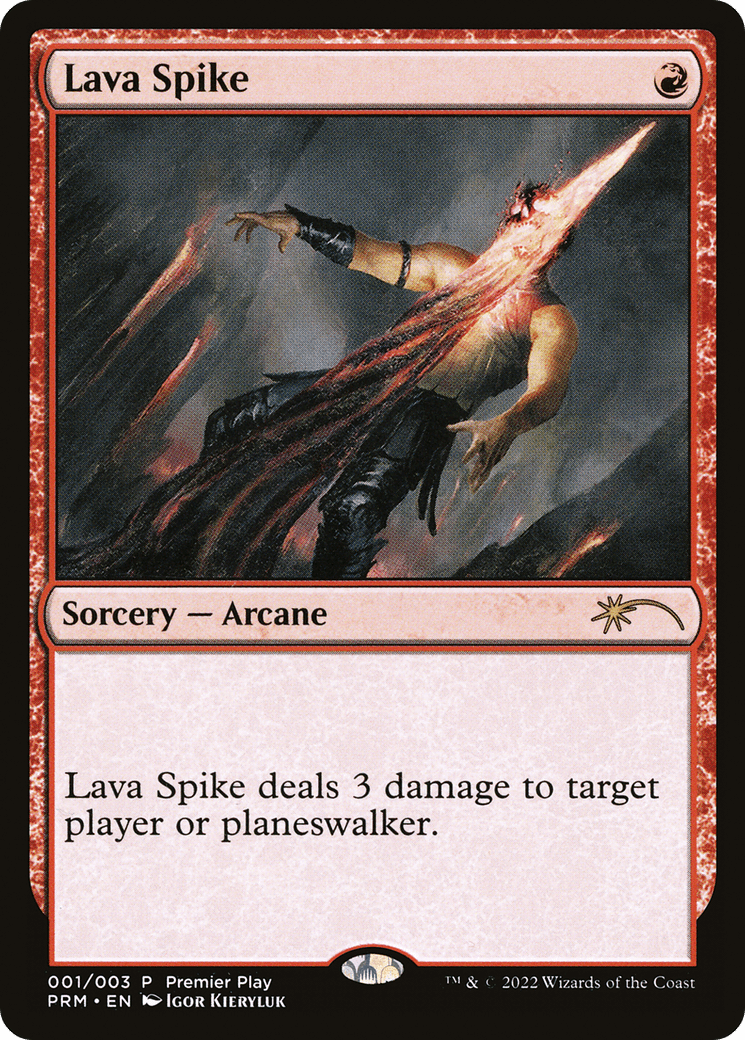
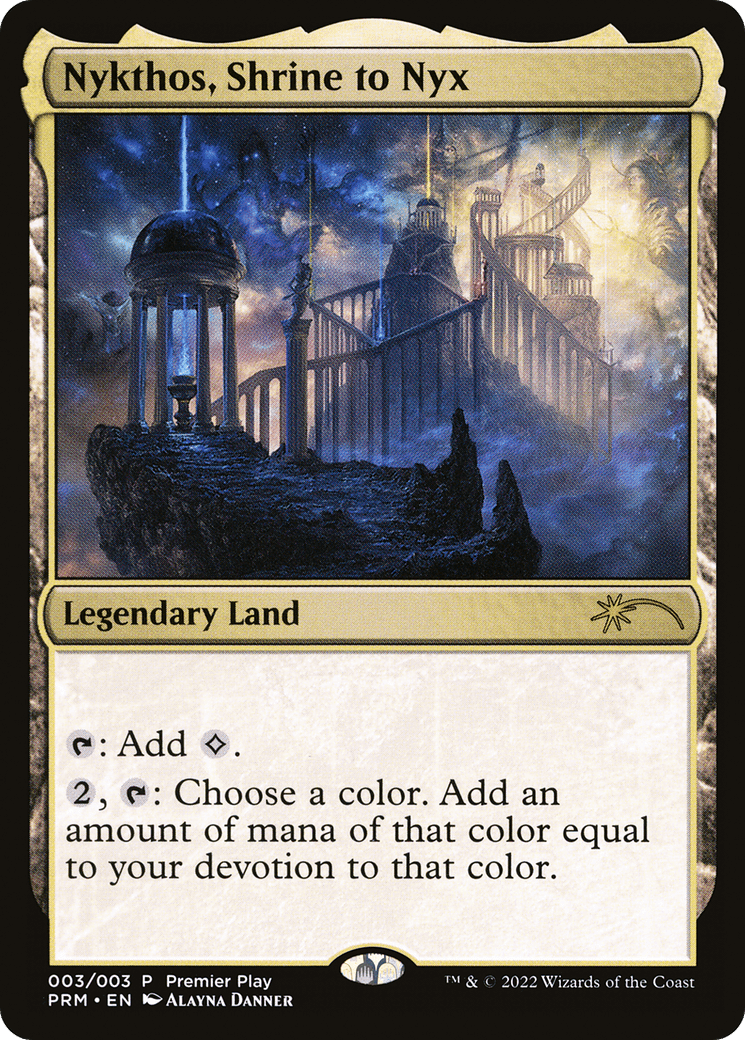
Most of the Regional Championship Qualifiers I’ve seen advertised online here in Central Florida have been Pioneer or Modern. Your experiences may be different depending on what kind of Magic people around you like to play. Be sure to test for whatever format you’re playing in!
Finding Regional Championship Qualifiers can be done in a couple of ways. There are three main tools I’d recommend you use.
WotC Event Locator/Spicerack
Wizards' Store and Event Locator used to be my first stop for finding stores/events in my area. Simply enter your zip/address and the site will give you all the best MTG spots in your area. Note that the “Magic Premier Events” function does unfortunately seem to not work, so rather than relying on that I would recommend looking at the websites of close local game stores for tournaments. Feel free to give them a call as well to confirm any relevant event details. Check out this article for more detail about finding stores near you.
However, one site I discovered recently is the wonderful Spicerack. This is an ambitious project similar to Scryfall, which has replaced Gatherer as my go-to card search engine. Like Scryfall, Spicerack is basically just WotC’s Event Locator but better. It has a more intuitive interface, an easier time localizing itself to your area, options to break down search results by format, and more. Highly recommended site!
MTG Melee
Direct filtering for RCQs on MTG Melee returns quite a few events! You’ll definitely need to do some grunt work to figure out which ones are a viable drive from where you are located though. Still, it’s nice to have such a strong catalog of RCQs in one convenient place.
This much-maligned social media site is an unironically great tool for Magic players, and it makes a great companion to the WotC Event Locator. Most local game stores have Facebook pages where they advertise tournaments and special events they’re hosting.
There are also local MTG Facebook groups like “MTG Orlando” where you can find events, trades, and players to test with.
Casual Events
Before we get into Regional Championships I just wanted to briefly touch on casual paper events. Despite me calling them “casual,” these are a great place to get in reps with a deck or format before you play it in a more serious tournament.
Friday Night Magic
This is the classic standard for casual or semi-casual play. Your mileage with FNM will vary immensely based on your area. Some shops have 40+ player FNMs every night while others might fail to fire an 8-player Draft every week.
It’s good to do a bit of window shopping with the store locators to find the best locations at a reasonable distance!
Store Championships
Store Championships are the “Pro Tour” of casual events and usually give you decent prizes or bragging rights at your LGS. WotC often prints promos for these as well, like the Arbor Elf and Collected Company ones I won last time.
You won’t qualify for anything by winning one of these, but it’s usually a good time!
Other Store Events
FNMs and Store Championships are by no means the only local events out there. You might find cEDH tournaments, Chaos Sealed tournaments, local Modern $1ks, and more depending on your LGS.
A bit of research could be your first step towards a more fulfilling experience with MTG.
Regional Championships
Regional Championships are your next step towards the Pro Tour. You can think of them as PTQs if you’re an old system veteran. You have to qualify for an RC by winning an RCQ, and then place well to advance to the Pro Tour next year. All participants in an RC are gifted a cool yearly promo, with foils going to top finishers.
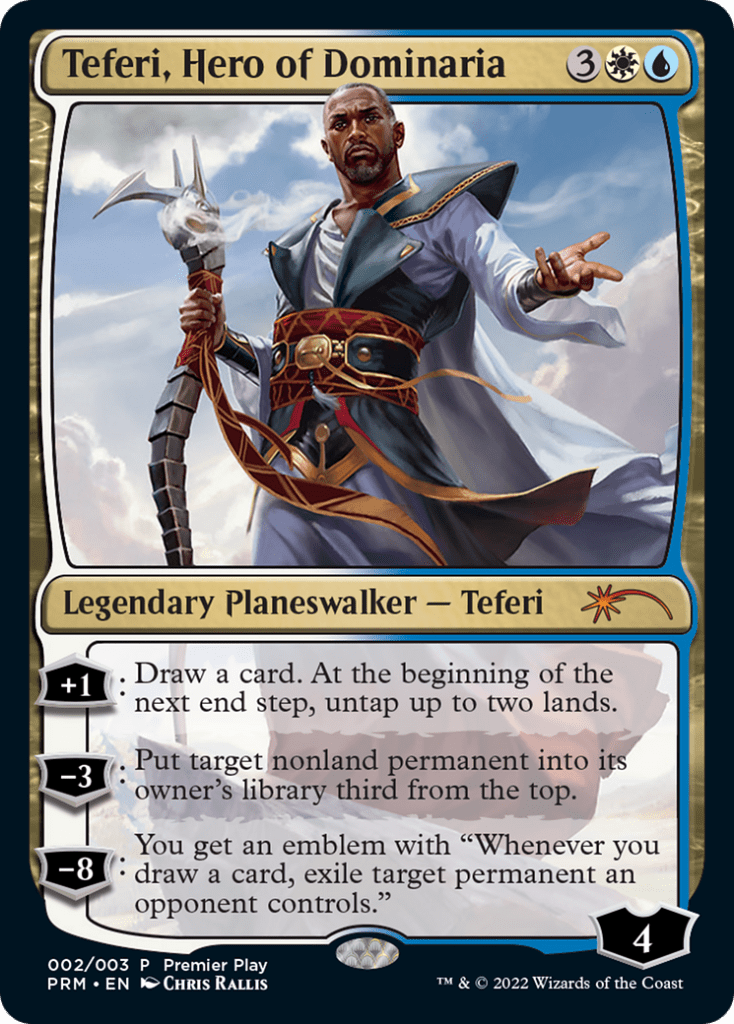
Winning the RCQ (no small feat) immediately qualifies you for Worlds! And all participants in a RC are gifted a Teferi promo, with foils going to top finishers.
The next Regional Championship in America is at Dreamhack Atlanta from November 18th to 20th with a prize pool of $150k! There will likely be several more RCs next year too.
The Pro Tour
The most prestigious event in Magic finally returned last year! Players who qualify for the Pro Tour represent their country on the global stage for MTG.
I have fond memories of the paper Pro Tours I played years ago (Hour of Devastation, Ixalan, Dominaria, and Throne of Eldraine) and am personally thrilled that the PT is back. There aren’t a ton of details on how exactly the Pro Tours are going to be run just yet. All we know is that “early 2023” is the target and $500k is the estimated prize pool.
The World Championship
While I still maintain that the Pro Tour is more prestigious, World’s is the actual end boss of competitive MTG. Think of it like the secret boss of a classic JRPG!
The road to World’s is surely a long one, but there’s no greater accomplishment in Magic than winning World’s. The prize pool for World’s scales to match this with an estimated total prize pool of $1 million spread between about 128 competitors.
MagicCons

MagicCons are huge social gatherings held for fans to appreciate MTG in a bunch of different ways. MagicCons often feature the following attractions:
- Huge Open tournaments, with prize pools up to $75k!
- Pro Tours
- Loads of side events
- Tons of vendors for buying/selling cards
- Cosplay competitions
- Meet and greets with artists, Play Design members, and MTG personalities
- Pro Tour Qualifiers that can potentially skip the RCQ/RC pipeline, and take you directly to the PT!
- Sneak peaks/presentations for future Magic sets/content
- Themed social events like this EDM dance party
Old hats will remember Grand Prix, which were similar but had less “other” stuff to do besides tournaments and side events. Whether or not this is a good change depends on your approach to the game. As someone who has been to a pair of these, let me divulge a bit of my personal perspective on my experiences.
Vendor Experience
My experience with vendors at these events has been very good! I’m mostly a Limited player, so I’m always looking for ways to sell my cards conveniently. MagicCons have been one of my better experiences doing so, as the dealers will often have mats where my cards are laid out with clear sell prices. I’ve never felt a “shady car dealership” vibe either, as most vendors are quite friendly and transparent with their prices.
Pricing
I’m not directly affiliated with WotC or anything, so I’m happy to be honest and tell you that these events are not cheap! You’ll need to buy a badge for each day you're there, plus pay for any events, cards, food, travel expenses, etc. Depending on how you budget and how far you have to travel, you could be looking at $500-$1000~ in expenses. I often traveled with fellow grinders who I was already friendly with, as sharing a hotel or AirBnB is a great way to cut down on costs.
Pro Tour Qualifiers
These are pricey ($100 an entry for the last one I did), but they also have substantial prizes and do indeed take the winner to the Pro Tour. I made 4th place at a March of the Machine PTQ in one of these, and walked away with several Collector Boxes (good for about $600~ in prizes). If you like high stakes competitive Magic, these are a good reason to go to a MagicCon.
Open Events
The last MagicCon I went to did not have an Open, but I imagine these are still great fun. Opens are the closest thing we have today to the old Grand Prix style competitions. Hopefully I get to do one this year!
Other Stuff
I’m not really much of a cosplay guy myself, but I still enjoy seeing the creativity whenever I’ve been to these events. There are often prizes/shows for costumes too, and it could be a good opportunity to make friends. I’d also encourage you to check out the panels/other fun events, especially if you ended up traveling away from home for this. Remember, everyone is there for Magic in some form; you have an easy conversation starter!
2024 MagicCon Events

MagicCon Chicago (Chicago, Feb 23-25)
This one featured a $75k Standard Open, Pro Tour Murders at Karlov Manor, and a bunch of neat events themed around this new Murder mystery set.
MagicCon Amsterdam (Netherlands, June 28-30)
European players rejoice! This MagicCon focuses on Modern Horizons 3 and the Pro Tour's happening right at this Con.
Magic Online
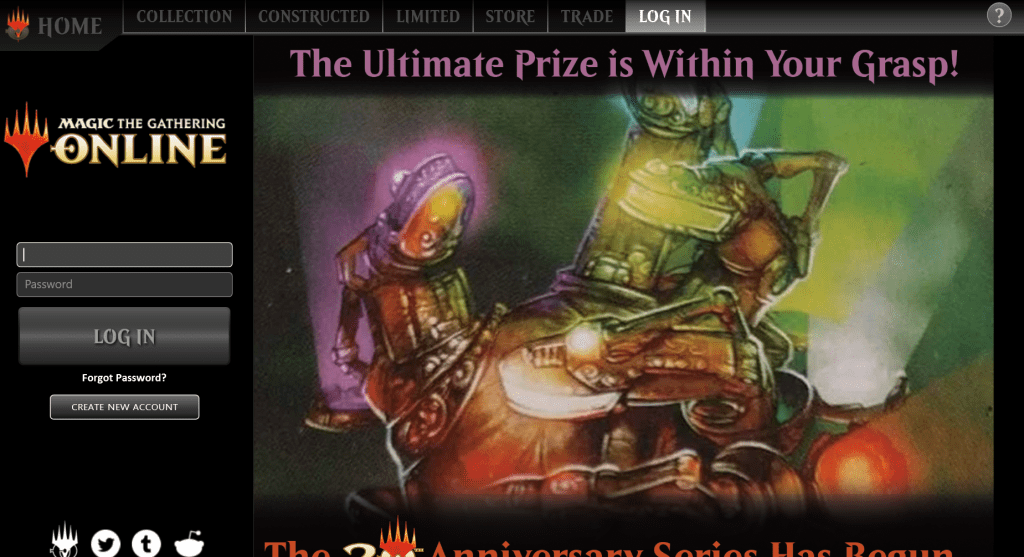
Arena’s uglier older cousin is still a solid way to compete at Magic. Once you get over the initial learning curve for the interface, MTGO is actually quite nice. Especially if you play formats like Modern or Pioneer, which aren’t on Arena.
Magic Online has some unique play systems worth covering for tournament play.
MTGO Currencies
The first thing to understand about competing on Magic Online is that there are multiple unique currencies you have to manage. There are three main currencies plus a few other objects you might be given as you play Magic Online.
Event Tickets
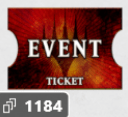
Event Tickets are the primary currency of MTGO and can be used to enter events and buy cards from bots. They have a conversion rate to the dollar of roughly 90 cents a ticket, but this number varies over time.
You can farm event tickets by selling unused cards or product to bots, or just buy them via Magic Online or third-party vendors. You can also sell MTGO tickets if you end up with extra.
Play Points
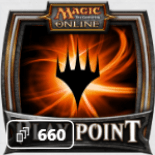
Play Points were added to MTGO several years ago. They’re a secondary currency that can only be used to enter events. They have no use for the secondary market as you can’t sell or trade them.
You should always use play points instead of tickets to enter events because of their lack of liquidity. Ten play points are roughly equivalent to $1 given Event Ticket rates to enter events.
From a business perspective, Play Points provide a way for WotC to keep the player continuously entering events since some of their prize pool comes in the form of a currency with no value other than entering more events.
Qualifier Points
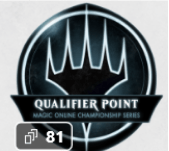
Qualifier Points are the basic competitive currency of Magic Online. You earn these via Leagues and Preliminary events and can use 40 QPs to enter most tournaments. QPs are sometimes required for entry, but other times you might have the option of either 40 QPs, 40 Event Tickets, or 400 Play Points.
I like to spend my QPs whenever possible because I usually end up with too many of them. Try to get any grinding done in advance so you aren’t caught cramming for a tournament!
Competitive Trophies
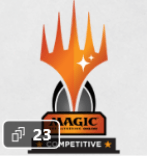
You accumulate Competitive Trophies as you win Leagues. Collect enough Trophies by the end of a season and you can unlock exclusive avatars. They have no resale value or other purpose, they’re just for aesthetics.
Magic Online Championship Series Leaderboard Points
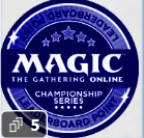
This is a unique currency you can win for placing well in certain events. The two players with the most Magic Online Championship Series Leaderboard Points are invited to both the next Pro Tour and the MOCS, Magic Online’s most prestigious event.
Preliminaries
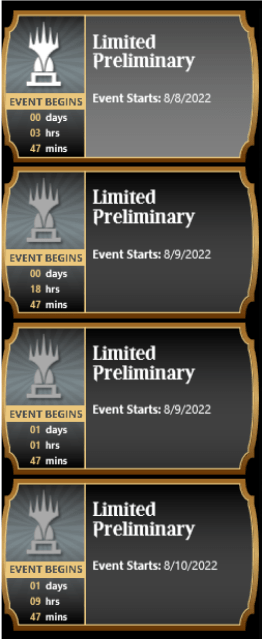
Preliminaries are your basic PPTQ-style event on Magic Online that are used to qualify for other events. You can acquire QPs gradually through grinding leagues, but Prelims offer the best return for your time if you can place 3-1 or better.
Prelims are available for just about every format and are 4-round events with payouts based on standings.
Super Qualifiers
Super Qualifiers are similar to RCQs but happen on Magic Online instead of paper. They’re held one or two times a month in a variety of Constructed and Limited formats.
Super Qualifiers are usually between seven to nine rounds with a cut to top 8 and then a top 8 playoff. The winner qualifies for the next Regional Championship, but even those who just top 8 are paid out fairly well ($150+ in value with $600 in value going to first).
They can be time-consuming but have personally helped pay my rent for many years.
Magic Online Championship Series Qualifier Events
There have been a variety of ways to qualify for the MOCS over the years. MOCS Opens can take you directly there, while smaller Qualifier events have been an option for a PPTQ to PTQ-style entry.
Currently you have to qualify for Showcase Challenges, which feed directly into the MOCS.
Magic Online Championship Series
The MOCS is the most prestigious event on Magic Online. It’s an invite-only 8-player competition with a $70k prize pool. Eighth place gets you $5k while first gets you $20k and entry to the next Pro Tour or Worlds!
This year’s MOCS is Modern Cube/Pioneer, but the format varies from year to year, The last one was Vintage Cube/Modern. It’s a long haul to qualify for the MOCS but is well worth it if you play a lot of Magic Online.
Wrap Up
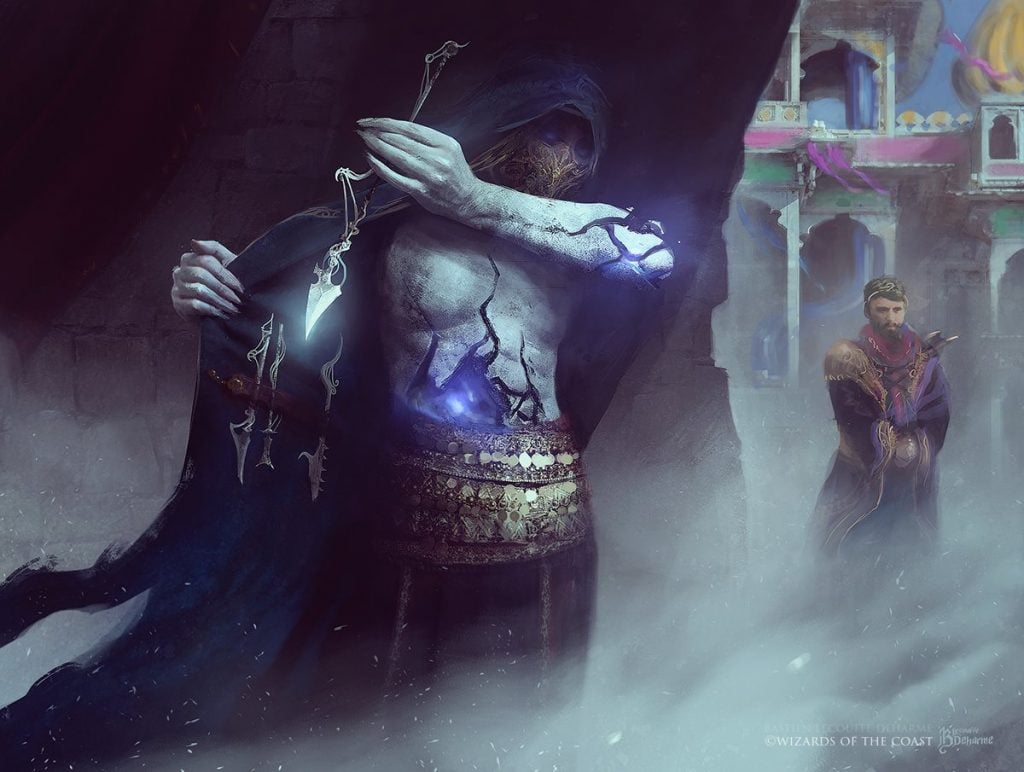
Tidy Conclusion | Illustration by Bastien L. Deharme
Competitive Magic is the best form of Magic there is, and I severely doubt I’d still be playing this game nine years after I started if not for its tournament scene. Though the-virus-that-must-not-be-named did do some unfortunate damage to MTG, the planeswalker’s spark of competition burns on in the hearts of many. It’s my hope that eventually I’ll once again be seated at a Pro Tour Draft pod, ready to go 3-0 against some of the world’s best.
What’s your favorite tournament out there? Do you think that Arena has better events than Magic Online or the other way around? Or is paper your preferred way to play? Let me know in the comments down below or join the discussion in the Draftsim Discord. And if MTGA is your go-to, make sure you’ve got Arena Tutor to help you out while you practice.
Until next time, may your tournaments always go well for you!
Follow Draftsim for awesome articles and set updates: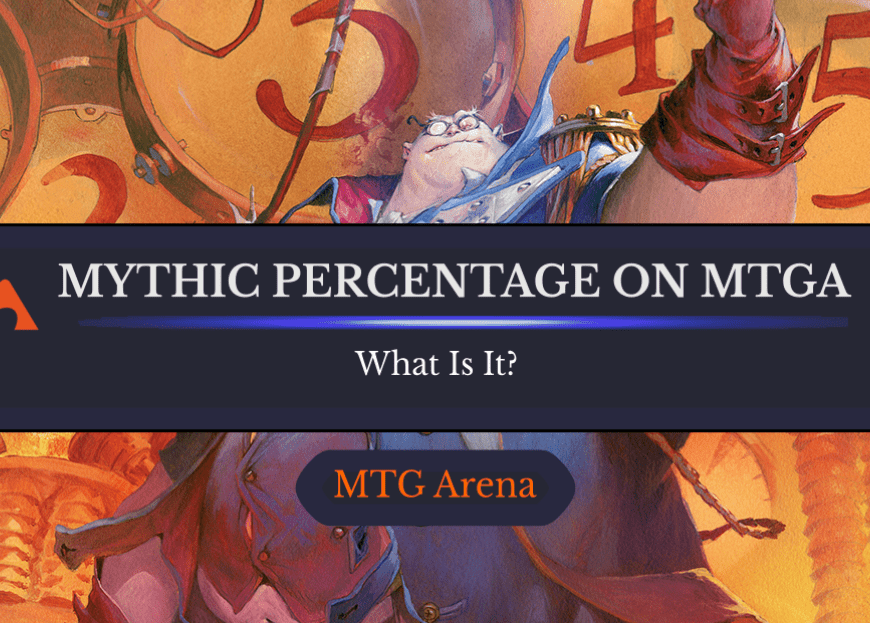
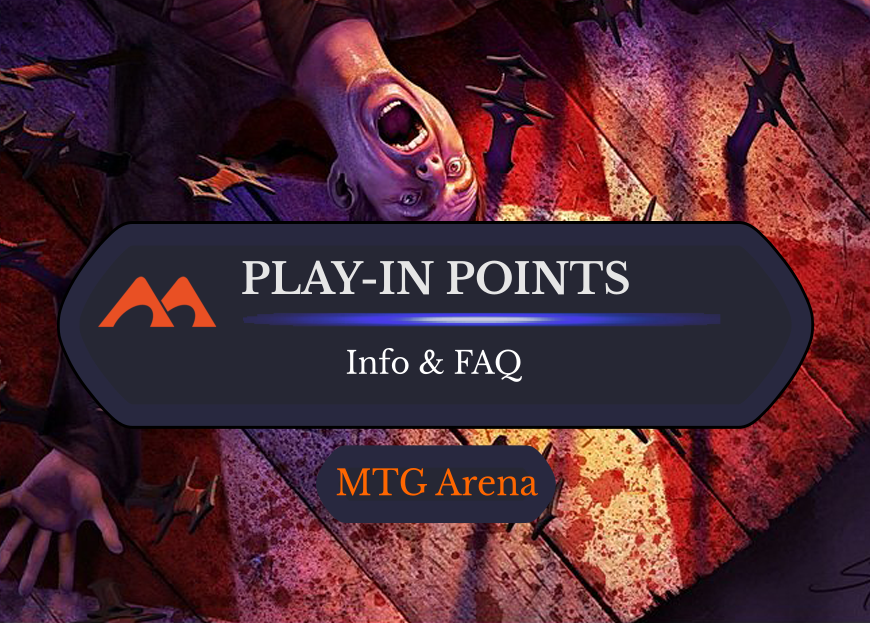
Add Comment